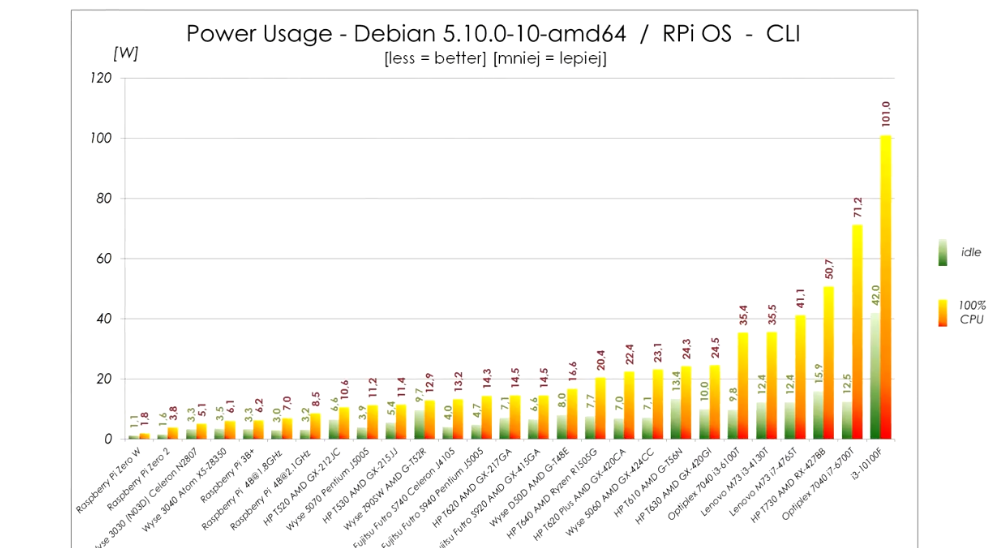Hey all, I’m looking to build a couple dashboards out around my house. I’ve done this before with rokchip boards and they are… fine, but not great. Is rpi the best option right now? Are there alternatives you really like? I’d like to keep it a single board to easily mount behind things where it doesn’t take up a lot of space, and I won’t lie I like the DIY feeling of it over something like a thin client.


Many have said this. If you don’t need the GPIO, get a small PC.
Or if you do not care about power consumption.
The n100 and n200 have quite low TDP values for much better performance than a Pi.
They still consume way more power than the pi. My pi fully loaded uses less power than my N100 router idle.
A refurbished tiny/mini/micro PC will use more power in terms of sheer numbers, but the cost is still so small on them that it’s really not worth considering for most.
If you search ebay for Intel based thin clients, many are more powerful than RPi while being passively cooled and having very similar power consumption.
Never have seen a thin client that goes below 7ish Watt on idle. Basically every RPi does. https://www.pidramble.com/wiki/benchmarks/power-consumption
Thin clients based on J5005 or J4105 generally idle under 5W. (Futro S740, Wyse 5070,…) They consume a bit more when 100% loaded (11W vs 8W), but they also provide about 2x performance of Pi4.
(That article you shared is measuring power consumption on the USB port, which does not take into account overhead of USB adapter itself)
Pls, provide some proof for those numbers. The ‘under 5W mark’ gets often claimed but i still have not seen a valid proof (a simple measurement with a wattmeter) of it other than some spec sheet.
The overhead does not matter really. USB 5V power supplies are cheap and efficient these days, yes you need to look out for an efficient one but even one with only 50% efficiency (which is really really bad) would only add 1W to the (lower than) 2W power in idle. That would still result in lower power in idle.
Thank you. Would love to see the true idle. The difference between idle and light load is often not that high. I imagine the CPU supports virtualization?
And would also love to know some more specs of the NUC.
It has an older i3 quadcore @ 3ghz max with 16gb ram and 1tb nvme, can’t remember the model number.
I think idle without any VMs or containers running is around 6.5W, so no it’s not much lower.
I have a bunch of these myself and that is my experience, but don’t have any screenshots now.
However there’s great comparison of these thin clients if you don’t mind Polish: https://www.youtube.com/watch?v=DLRplLPdd3Q
Just the relevant screens to save you some time:
Power usage:
Cinebench multi core:
The power usage in idle is within 2W from Pi 4 and the performance is about double compared to overclocked Pi 4. It’s really quite viable alternative unless you need really small device. The only alternative size-wise is slightly bigger WYSE 3040, but that one has x5-z8350 CPU, which sits somewhere between Pi3B+ and Pi4 performance-wise. It is also very low power though and if you don’t need that much CPU it is also very viable replacement. (these can be easily bought for about €60 on eBay, or cheaper if you shop around)
Also each W of extra idle power is about 9kWh extra consumed. Even if you paid 50c/kWh (which would be more than I’ve ever seen) that’s €5 per year extra. So I wouldn’t lose my sleep over 2W more or less. Prices here are high, 9kWh/y is rounding error.
Here is an alternative Piped link(s):
https://www.piped.video/watch?v=DLRplLPdd3Q
Piped is a privacy-respecting open-source alternative frontend to YouTube.
I’m open-source; check me out at GitHub.
What if I want a computer I can power via PoE?
I have never thought about this. Thanks for pointing it out.
You’re welcome.
And I do. I have a PoE switch so the more things I can make PoE the easier it is.